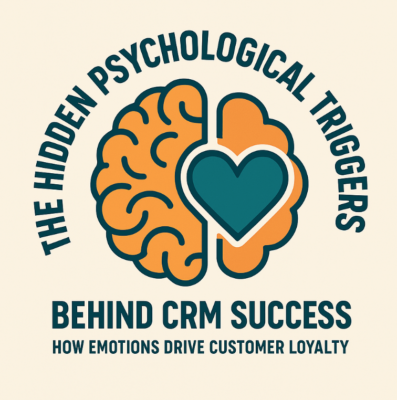
Customer Relationship Management (CRM) is often perceived as a data-driven system that helps businesses manage interactions with customers. However, beyond automation and analytics, the real power of CRM lies in its ability to tap into human emotions. Understanding the psychological triggers behind customer behavior can significantly enhance customer loyalty and retention. Here’s how emotions play a crucial role in CRM success.
1. The Power of Personalization
One of the most effective ways CRM systems leverage psychology is through personalization. Customers appreciate feeling recognized and valued, which triggers emotional connections. When a CRM system uses data to recommend relevant products, send personalized emails, or remember past interactions, it fosters a sense of belonging. Studies have shown that personalization increases engagement and enhances the overall customer experience, making customers more likely to return.
2. Building Trust Through Consistency
Trust is a fundamental psychological trigger in any relationship, including business-customer interactions. A CRM system ensures consistency in communication, response times, and service quality. When customers repeatedly experience reliable service, they develop trust in the brand. Trust, in turn, leads to loyalty and advocacy, as customers feel secure in their decision to continue engaging with the company.
3. The Scarcity Effect and Urgency
CRM strategies often incorporate psychological principles such as scarcity and urgency. Limited-time offers, exclusive deals, and personalized promotions create a sense of urgency, prompting customers to take action. This psychological trigger works because people tend to value things more when they perceive them as rare or time-sensitive. Implementing these tactics within a CRM system can drive conversions and repeat purchases.
4. The Reciprocity Principle
Reciprocity is a powerful psychological concept where people feel compelled to return a favor. CRM can harness this principle by offering value first—such as providing helpful content, exclusive discounts, or free trials. When customers receive something beneficial, they are more likely to reciprocate by making a purchase, leaving positive reviews, or recommending the brand to others.
5. Emotional Connection Through Storytelling
CRM is not just about managing transactions; it’s about nurturing relationships. Companies that use storytelling to connect with customers on an emotional level can strengthen their brand loyalty. CRM tools can track customer preferences and engagement, allowing businesses to craft compelling narratives that resonate with their audience. Whether through targeted email campaigns or social media interactions, emotionally engaging stories can turn customers into lifelong advocates.
6. Leveraging Social Proof
People tend to trust the opinions of others, which is why testimonials, reviews, and social proof are essential in CRM strategies. When CRM systems collect and display positive customer feedback, it reinforces trust and credibility. Seeing that others have had a great experience makes potential customers more likely to engage with the brand.
Conclusion
CRM is much more than a tool for managing customer data—it’s a bridge between businesses and customers, built on psychological principles that drive emotional engagement. By leveraging personalization, trust, scarcity, reciprocity, storytelling, and social proof, businesses can create a CRM strategy that fosters deep emotional connections. In the end, emotions are the key to long-term customer loyalty, and a well-implemented CRM can be the catalyst that turns occasional buyers into devoted brand advocates.